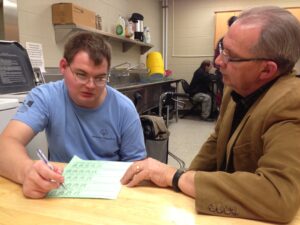


Description of the Tool
Using principles of community-based participatory research we developed a measure of health-related quality of life (HRQoL) for individuals with intellectual and developmental disability (IDD). The resulting HRQoL measure, called the HRQoL-IDD-16, contains 16 items. The response format depicts a gradient of fluid-filled cups (‘‘none’’ to ‘‘full’’) to represent frequency of experience of each item on a 5-point scale.
Intended Use
The HRQoL-IDD-16 measure is to be completed by adults with intellectual and developmental disability, not by proxy respondents. The measure is appropriate for research and/or community-based administration with minimal supervision and limited respondent and agency burden.
Why it Was Developed
HRQoL is increasingly used as an outcome in clinical trials, effectiveness research, and research on quality of care (Wilson & Cleary, 1995) and is a critical outcome indicator in evaluating health care needs of people with intellectual and developmental disability (IDD) (Fujiura, 2012; Parmenter, 2001). It is an especially relevant indicator of the process of health care because it is multifaceted and one of the strongest predictor variables of mortality and morbidity (DeSalvo, Bloser, Reynolds, He, & Muntner, 2006). Unfortunately, many measures of HRQoL used with people with IDD are insufficient or inadequate. Some are borrowed from general community quality-of-life measures and lack validation for this population. Even among instruments created for people with IDD, common measurement limitations include problematic measurement design, poorly structured and sequenced questions, inappropriate response formats, and distortions related to acquiescence and social desirability (Cardell, Clark, & Pett, 2015). Other measures prove faulty when used in community-based settings due to the heterogeneity of abilities of respondents (Finlay & Lyons, 2001; Fujiura, 2012). In principle, health and social service providers espouse the importance of self-reported subjective experiences like quality of life, yet proxy respondents such as family members and staff are often asked to answer subjective questions about HRQoL for practical reasons. Even when well-intentioned, proxy reports about subjective experiences yield different results than self-reports (Claes et al., 2012). Whenever people can respond for themselves, quality-of-life researchers recommend self-report as a statistically reliable best practice aligned with values of self- determination and empowerment (Claes et al., 2012; Fujiura, 2012). To advance our science and improve health-related quality of life for people with IDD, our research team developed partnerships with community partners in clinical care, recreation, and advocacy centers. Through these partnerships we engaged adults with IDD to help shape a measure of health-related quality of life.